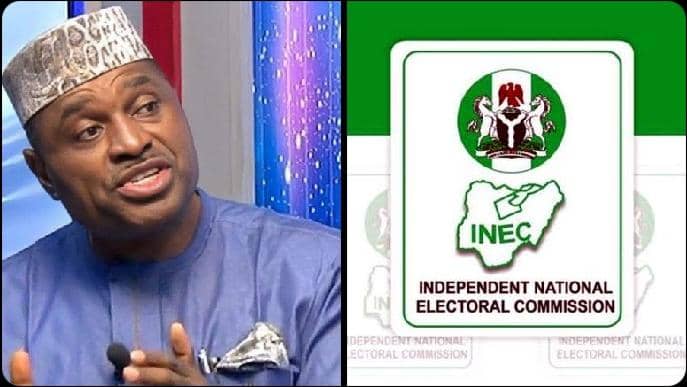Kenneth Okonkwo, a prominent Nigerian lawyer, actor, and former Labour Party chieftain, made a bold statement on June 9, 2025, during an appearance on Arise Television, alleging that the Independent National Electoral Commission (INEC) has become a “department” of the ruling All Progressives Congress (APC). This provocative claim, rooted in concerns about electoral integrity, has reignited debates about INEC’s impartiality as Nigeria looks toward the 2027 general elections. Okonkwo’s assertion reflects a growing sentiment among opposition figures and some segments of the public who question the commission’s independence amid Nigeria’s polarized political landscape.
Okonkwo’s comments were made in the context of discussions about a potential mega-party coalition aimed at challenging the APC’s dominance in 2027. He argued that INEC deliberately creates bureaucratic hurdles to frustrate opposition efforts, particularly in registering new political parties. According to Okonkwo, these obstacles force opposition groups to merge with existing parties rather than form new ones, a process he described as intentionally cumbersome to favor the ruling party.
The lawyer pointed to INEC’s handling of electoral processes as evidence of bias, alleging that the commission delays or complicates procedures to undermine opposition strategies. He suggested that these actions align INEC’s operations with the APC’s interests, effectively turning the electoral body into an extension of the ruling party. While Okonkwo did not provide specific instances or documentary evidence during the interview, his remarks echo longstanding criticisms of INEC’s conduct in past elections, including the contentious 2023 presidential election.
Public discourse amplified similar sentiments, with some users claiming INEC manipulates voter registration, result collation, and party registration processes to benefit the APC. Some posts on social media have referenced unverified allegations of INEC officials colluding with APC operatives, though these claims lack substantiated evidence and remain speculative. The absence of concrete proof underscores the challenge of distinguishing between legitimate concerns and political rhetoric in Nigeria’s charged electoral environment.
INEC, established under the 1999 Constitution of Nigeria, is mandated to operate as an independent body responsible for conducting free and fair elections. However, its credibility has been questioned repeatedly, particularly after the 2023 elections, where technical glitches with the Bimodal Voter Accreditation System (BVAS) and delays in result transmission fueled accusations of manipulation. Okonkwo’s statement taps into these frustrations, reflecting a broader distrust in the electoral process among opposition supporters.
Historically, allegations of INEC bias are not new. During the 2019 elections, opposition parties, including the People’s Democratic Party (PDP), accused INEC of favoring the APC through irregularities in result collation and voter suppression in opposition strongholds. Independent observers, such as the European Union Election Observation Mission, noted systemic issues in 2019 and 2023, including inconsistencies in INEC’s processes, though they stopped short of confirming partisan bias.
Okonkwo’s call for electoral reform aligns with demands from civil society organizations and political analysts who advocate for stronger safeguards to ensure INEC’s independence. Proposals include amending the Electoral Act to enhance transparency, such as mandating real-time result transmission and reducing manual processes prone to manipulation. However, implementing such reforms faces challenges, including political resistance from entrenched interests benefiting from the status quo.
The APC has not officially responded to Okonkwo’s claims, but party spokespersons have historically dismissed similar allegations as opposition propaganda aimed at discrediting the government. INEC, for its part, maintains that it operates within its constitutional mandate and has urged critics to provide evidence of misconduct. The commission’s silence on Okonkwo’s specific accusation, as of June 10, 2025, leaves room for further public speculation.
The controversy comes at a time when Nigeria’s political landscape is shifting, with opposition leaders like Atiku Abubakar, Peter Obi, and Rabiu Kwankwaso reportedly exploring a coalition to challenge the APC. Okonkwo’s remarks highlight the strategic importance of a neutral electoral umpire in ensuring a level playing field. Without addressing these concerns, public trust in INEC risks further erosion, potentially undermining the legitimacy of future elections.
Analysts suggest that Okonkwo’s statement is both a critique of INEC and a rallying cry for opposition unity. By framing INEC as an APC appendage, he underscores the need for opposition parties to overcome internal divisions and navigate institutional challenges. However, the lack of specific evidence in his claim risks it being dismissed as partisan hyperbole, particularly by APC supporters.




